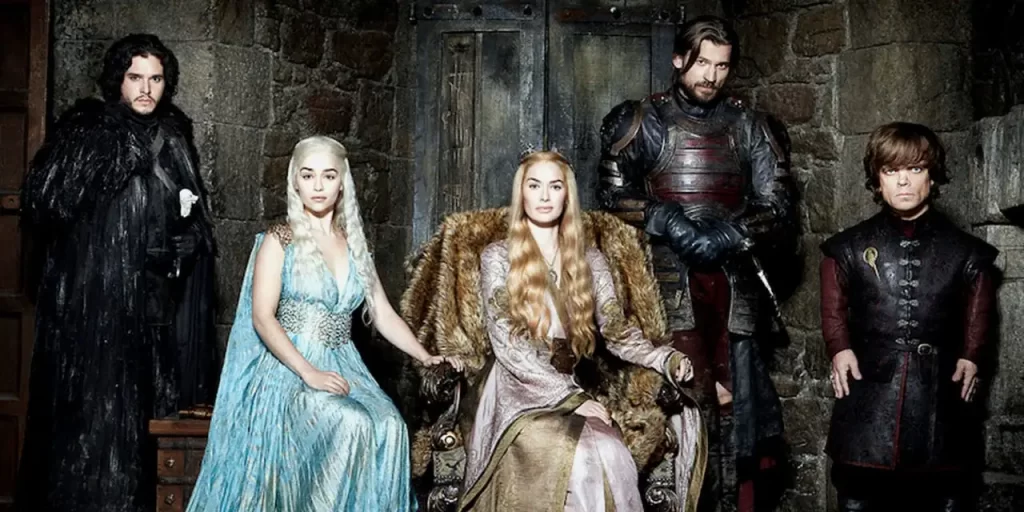Contents
Game of Thrones is a captivating television series that transports viewers to the enchanting realm of Westeros, a fictional continent brimming with intrigue, power struggles, and the constant threat of impending doom. At the heart of the story lies the pursuit of the coveted Iron Throne, a symbol of absolute power that numerous noble families seek to claim as their own.
The narrative follows the lives of several key characters, each with their own motivations, alliances, and personal agendas. From the ambitious Lannister family, whose cunning and wealth know no bounds, to the noble Stark clan, who find themselves embroiled in a web of deceit and betrayal, the show weaves a tapestry of complex relationships and shifting allegiances that keep audiences on the edge of their seats.
As the series progresses, the stakes only continue to rise, with the looming threat of the White Walkers, a terrifying army of the undead, lurking in the North. The race to secure the Iron Throne becomes increasingly perilous as the characters must navigate treacherous political landscapes, navigate the treacherous waters of familial loyalty, and ultimately confront the existential threat that could determine the fate of all of Westeros.
The Impact and Popularity of Game of Thrones
The cultural impact of Game of Thrones is undeniable, as the series has captivated audiences worldwide and become a true phenomenon in the world of television. From its humble beginnings as a critically acclaimed adaptation of George R.R. Martin’s “A Song of Ice and Fire” book series, the show has since transcended its literary origins to become a global phenomenon, inspiring a legion of devoted fans and sparking countless discussions, theories, and debates.
The show’s success can be attributed to its masterful storytelling, its ambitious scope, and its ability to delve into the complexities of human nature. Game of Thrones has resonated with viewers on a deep level, tapping into universal themes of power, loyalty, betrayal, and the consequences of our actions. The show’s ability to blend high-stakes political intrigue with fantastical elements, such as dragons and sorcery, has further contributed to its widespread appeal, captivating audiences who crave a sense of escapism and adventure.
The show’s popularity has also had a significant impact on the entertainment industry, inspiring a new era of high-quality, big-budget television productions. Game of Thrones has raised the bar for what audiences expect from their favorite shows, setting a new standard for cinematic visuals, complex character development, and intricate world-building. The show’s success has also had a ripple effect on the tourism industry, as fans flock to the show’s filming locations, further cementing its status as a cultural phenomenon.
Memorable Characters and Their Arcs
One of the key reasons for the enduring popularity of Game of Thrones is the show’s rich and complex cast of characters. From the cunning and manipulative Cersei Lannister, whose thirst for power knows no bounds, to the noble and principled Daenerys Targaryen, who seeks to reclaim her family’s rightful throne, each character is imbued with depth, nuance, and a compelling narrative arc.
The show’s ability to subvert expectations and challenge traditional archetypes is particularly evident in the way it handles its characters. For instance, the show’s protagonist, Jon Snow, initially appears to be the quintessential heroic figure, but his journey is marked by a series of profound revelations and unexpected twists that challenge the audience’s preconceptions about his role and identity.
Similarly, the show’s treatment of its female characters is particularly noteworthy, as it presents a diverse range of complex, multifaceted women who defy traditional gender norms and assert their agency in a male-dominated world. From the cunning Arya Stark, who transforms from a young girl into a skilled assassin, to the resilient and resourceful Sansa Stark, who navigates the treacherous political landscape of King’s Landing, the show’s female characters are some of its most compelling and memorable.
Themes and Symbolism in Game of Thrones
At its core, Game of Thrones is a rich tapestry of themes and symbols that explore the human condition in all its complexities. The show delves into the nature of power, the consequences of ambition, the importance of family, and the eternal struggle between good and evil.
One of the show’s most prominent themes is the pursuit of power and the corrupting influence it can have on individuals and institutions. The quest for the Iron Throne, the symbol of absolute authority in Westeros, drives many of the characters to engage in ruthless and morally questionable actions, highlighting the ways in which the desire for power can lead to the erosion of moral and ethical principles.
Similarly, the show’s exploration of loyalty and betrayal is a central theme that permeates the narrative. The characters’ relationships with one another are often marked by a constant tension between the bonds of family and the allure of self-interest, with characters frequently finding themselves torn between their personal desires and their obligations to their loved ones.
The show’s use of symbolism is also particularly noteworthy, with elements like the direwolves, the dragons, and the Wall serving as powerful representations of the show’s thematic concerns. The direwolves, for instance, are closely tied to the Stark family, symbolizing their connection to the natural world and their commitment to protecting their kin, while the dragons represent the Targaryen family’s legacy and the destructive power of unchecked ambition.

Filming Locations and Production Details
One of the most impressive aspects of Game of Thrones is the show’s ambitious and meticulous production values, which have helped to create a truly immersive and visually stunning viewing experience for audiences. From the sweeping landscapes of Northern Ireland to the sun-drenched deserts of Morocco, the show’s filming locations have played a crucial role in establishing the distinct and captivating atmosphere of the world of Westeros.
The show’s production team has gone to great lengths to ensure that every detail, from the intricate costumes and set designs to the seamless integration of visual effects, contributes to the overall authenticity and grandeur of the series. The use of practical effects, such as the construction of massive sets and the employment of skilled stunt performers, has helped to create a sense of realism and immediacy that has become a hallmark of the show’s cinematic quality.
Furthermore, the show’s commitment to using diverse filming locations has allowed it to capture the breadth and diversity of the fictional world of Westeros. From the rugged, windswept landscapes of Iceland to the sun-drenched beaches of Spain, the show has managed to transport viewers to a truly immersive and fully realized fantasy realm, one that feels both familiar and entirely alien.
Fan Theories and Speculation
One of the most remarkable aspects of Game of Thrones’ enduring popularity is the way in which it has inspired a vibrant and engaged fan community, with viewers eagerly sharing their own theories, predictions, and speculations about the show’s complex narrative and its enigmatic characters.
The show’s intricate plotlines and the abundance of unanswered questions have fueled a thriving online ecosystem of fan discussion and analysis, with dedicated subreddits, forums, and social media platforms serving as hubs for passionate debate and speculation. From the nature of Jon Snow’s true parentage to the ultimate fate of the Iron Throne, fans have dissected every detail of the show, offering their own unique insights and interpretations.
The show’s showrunners have often acknowledged the influence of nanastoto, with certain plot points and character developments being directly influenced by the ideas and speculations of the show’s dedicated fanbase. This interplay between the creators and the audience has helped to foster a sense of shared investment and investment in the show’s narrative, further cementing its status as a cultural phenomenon.
Controversies and Criticism Surrounding the Show
Despite its overwhelming popularity and critical acclaim, Game of Thrones has not been without its fair share of controversies and criticism over the course of its eight-season run. The show’s depiction of violence, sexual content, and its handling of sensitive themes, such as gender and racial representation, have all been the subject of intense scrutiny and debate within the broader cultural discourse.
One of the most persistent criticisms leveled at the show has been its treatment of female characters, with some viewers and critics arguing that the show has at times relied on exploitative or misogynistic tropes in its portrayal of women. The show’s use of graphic violence, particularly in scenes involving sexual assault, has also been a source of ongoing controversy, with some viewers and critics arguing that the show has crossed ethical boundaries in its depiction of such sensitive subject matter.
Additionally, the show’s final season, which aired in 2019, was met with a significant backlash from a segment of the show’s fanbase, who felt that the writers had failed to provide a satisfying and coherent conclusion to the series’ complex narrative. The show’s showrunners, David Benioff and D.B. Weiss, were widely criticized for their perceived missteps in the final season, with some viewers arguing that the show’s legacy had been irreparably tarnished by its controversial conclusion.
Legacy and Influence of Game of Thrones
Despite the controversies and criticisms that have surrounded it, Game of Thrones remains a towering achievement in the annals of television history, a series that has left an indelible mark on the medium and the broader cultural landscape. The show’s impact can be seen in the way it has inspired a new generation of ambitious, high-quality television productions, with its cinematic scope and thematic complexity serving as a benchmark for other shows to aspire to.
Beyond its immediate impact on the television industry, Game of Thrones has also had a profound influence on the broader realm of popular culture. The show’s iconic characters, quotable dialogue, and unforgettable moments have become deeply embedded in the collective consciousness of its global fanbase, with the series’ imagery and symbolism becoming the subject of widespread homage, parody, and fan-driven creative expression.
The enduring legacy of Game of Thrones can also be seen in the way it has sparked renewed interest in the fantasy genre, with the show’s success helping to pave the way for a new wave of high-profile fantasy adaptations and original productions. The show’s ability to seamlessly blend fantastical elements with complex, character-driven narratives has helped to challenge preconceptions about the genre and has opened the door for a more diverse and ambitious range of storytelling in the realm of fantasy.
As the dust settles on the series’ final season, it is clear that Game of Thrones has left an indelible mark on the television landscape and the broader cultural zeitgeist. The show’s ability to captivate and inspire its audience, to push the boundaries of what is possible in the medium, and to leave a lasting impact on the collective imagination of its viewers, is a testament to its enduring legacy as a true cultural phenomenon.
Also read: Shaheen Afridi: Pakistan’s Pace Sensation Shaping the Future of Cricket



